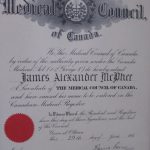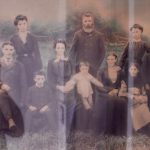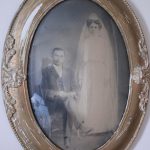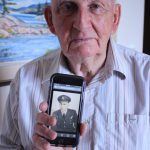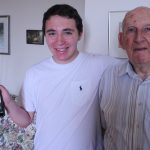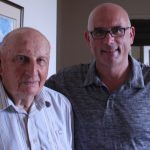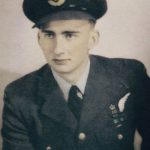Jim McPhee served in the RCAF during the Second World War. Jim grew up in northern Ontario, not too far from the Sault; Jim came from a large family, and lived not too far from Bruce Mines . Jim remembers going to a one-room schoolhouse in his early years, as well as work on the family farm, which insulated the family from the hunger of the Great Depression. As Jim got older, he left the community so he could attend high school, and with the coming of the war, the teenaged Jim found himself doing “victory” work for Algoma Steel. The work was arduous and Jim elected to go into the military; he opted for the air force and began his training stint in the British Commonwealth Air Training Plan, which took him all across the country. Jim had hoped to be a pilot but at that time the RCAF needed gunners, so Jim became an air gunner. Soon he was dispatched to Halifax, and from there the troopship took him to England. More training and crew selection followed as the men were prepared for the bombers. Jim and the crew were assigned to 408 Squadron, on Halifax bombers. They flew their first mission in November 1944, largely without incident. The second was flown later that month, but on just his second mission, the Halifax was hit; Jim was able to bail out, and he found himself on the ground in Germany. He spent a week surviving on his own, but he was found on a rural farm, and taken into custody. That marked the beginning of his life as a POW. Jim was interrogated and eventually sent to Stalag VIIB. But the Red Army was fast approaching, and the camp guards began a forced march of the POWs, moving them further into Germany. One morning the Germans were gone, and the men found themselves in Soviet custody, about to be pawns in a prisoner exchange scheme. Jim managed to escape at this point, making his way to the American zone – and liberation. He was taken to hospital and began his recovery, which would continue into Britain and Canada. Back across the Atlantic, Jim remained in the army and helped his fellow soldiers in the demobilization process; many of those he met were physicians, and that prompted his own interest in medicine. Against the odds, the farm boy from northern Ontario completed his education and graduated from medical school, going on to a long career of caring for others, and contributing to the postwar evolution of Canada.
We met Jim at his home in Barrie in July 2018, when he was interviewed by Scott Masters and Crestwood alumnus Zach Brown.
Videos
Click next video below to keep watching
- 1. Jim McPhee - Introduction and Early Life
- 2. The Great Depression and Pre-WW2 Events; Leisure and Victory Work
- 3. Air Cadets; Joining up and the BCATP
- 4. The Troopship; Arrival and Training in England; The Crew
- 5. First Combat Operation; November 21
- 6. On the Ground in Germany
- 7. A Prisoner of War
- 8. Conditions in the Camp
- 9. The Russians Arrive
- 10. Time in England; Readjustment; Return to Canada
